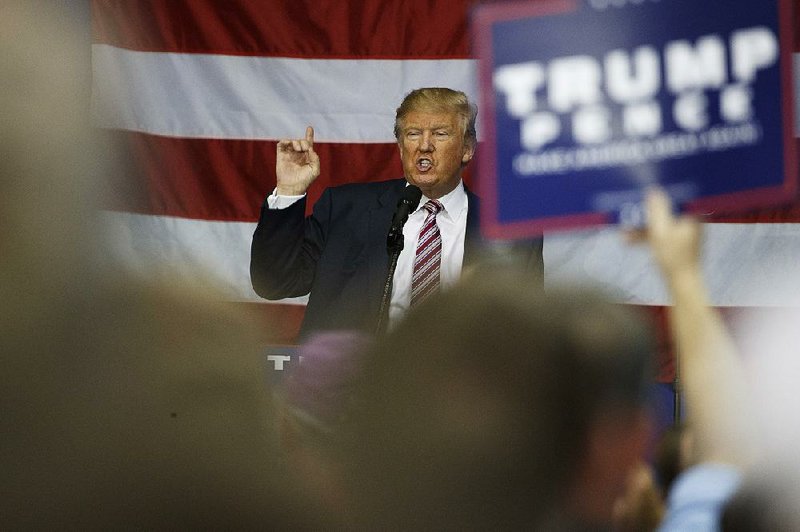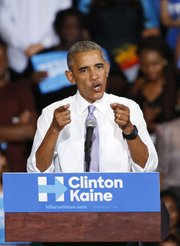DELAWARE, Ohio -- Donald Trump pledged Thursday to fully accept the outcome of next month's presidential election -- if he wins. The Republican said he reserved the right to contest questionable results, deepening his assertions that the race against Democrat Hillary Clinton could be rigged against him.
RELATED ARTICLES
http://www.arkansas…"> Hacked emails show aides' rift on Clinton event http://www.arkansas…">Arkansas' Republicans sure vote counting to be fair
http://www.arkansas…">Rivals add some acid to charity dinner
Trump's comments came a day after his refusal in the final presidential debate to say whether he would concede to Clinton if he loses. His resistance was roundly rejected by fellow Republicans.
U.S. Sen. John McCain of Arizona, the 2008 GOP nominee, called the peaceful transfer of power "the pride of our country."
"I didn't like the outcome of the 2008 election. But I had a duty to concede, and I did so without reluctance," McCain said in a lengthy statement. "A concession isn't just an exercise in graciousness. It is an act of respect for the will of the American people, a respect that is every American leader's first responsibility."
[INTERACTIVE: Video highlights from presidential, vice presidential debates]
Campaigning Thursday in Ohio, Trump tried to make light of the situation.
"I would like to promise and pledge to all of my voters and supporters and to all of the people of the United States that I will totally accept the results of this great and historic presidential election," he said. After letting that vow hang in the air for a few seconds, he added, "If I win."
The Republican nominee said he would accept "a clear election result" but reserved his right to "contest or file a legal challenge" if he loses. He brushed off the likelihood of that happening with a confident prediction that "we're not going to lose."
With mere weeks until the election, Trump repeatedly has raised the specter of a rigged election despite no evidence of widespread voter fraud heading toward Election Day or in previous presidential contests. His top advisers and his running mate Mike Pence have tried to soften his comments.
Asked in Wednesday's debate if he would accept the election results and concede to Clinton if he loses, Trump said: "I will tell you at the time. I will keep you in suspense."
Clinton slammed Trump's comments as "horrifying," and fellow Democrats piled on Thursday.
"That undermines our democracy," President Barack Obama said while campaigning for Clinton in Florida. "Our democracy depends on people knowing their vote matters."
The president tore into Republicans who have stood by Trump, singling out U.S. Sen. Marco Rubio, R-Fla., who had called Trump "a dangerous con artist" and condemned the businessman's more contentious comments during the GOP primaries but now plans to vote for him.
"Marco just seems to care about hanging on to his job," Obama said, calling the senator's positioning "the height of cynicism."
In Arizona, first lady Michelle Obama said Trump "is threatening the very idea of America itself" by suggesting he would not honor the election results. "You do not keep American democracy 'in suspense,'" she said in Phoenix.
U.S. Sen. Tim Kaine of Virginia, Clinton's vice-presidential running mate, held a rally at a brewery in downtown Charlotte, N.C., where he said Trump's claims of a "rigged" election reminded him of the Third World politicking he had seen as a young missionary in Honduras.
"The bigger we can win by, the harder it is for him to whine and have anyone believe him," Kaine said, trying to galvanize supporters on the first day of early voting in North Carolina.
He also questioned why Trump won't acknowledge that Russia has been behind the hacking of several email accounts of Democratic officials.
"You won't defend American democracy, but you will defend Vladimir Putin onstage?" Kaine asked.
A few clarifications
Trump's advisers and surrogates struggled to explain the candidate's position. Campaign manager Kellyanne Conway said it was too early to determine whether voting irregularities could make the difference between winning and losing.
She and other Trump backers drew a parallel to Al Gore and George W. Bush in 2000 as an example of why it would be premature for Trump to say he'd acquiesce on Nov. 8. That election, which played out for weeks, centered not on allegations of fraud but on proper vote-counting after an extremely close outcome in Florida led to a mandatory recount.
"I'm going to keep reminding everybody about the 2000 election when Al Gore said he would accept the results of the election and then did not," Conway said. "He retracted his concession."
Gore did formally concede the election a month after voting, when the U.S. Supreme Court stepped in to prevent a recount of Florida ballots.
Reince Priebus, chairman of the Republican National Committee, contended that Trump and the party would stand by the results unless the margin is small enough to warrant a recount or legal challenges. Priebus said Trump is merely preserving flexibility in the event of a contested result.
"All he's saying is, 'Look, I'm not going to forgo my right to a recount in a close election,'" Priebus said. "We accept the results as long as we're not talking about a few votes where it actually matters. I know him. I know where his head's at. ... I promise you, that's all this is.'"
Other Trump surrogates took a different interpretation. Keith Kellogg, a retired Army lieutenant general, accused the media of "splitting hairs" and insisted that Trump was "not threatening democratic norms," and former New York Mayor Rudy Giuliani argued that any Republican would be "stupid" to accept the integrity of results before they are known.
Democrats expressed dismay that the Republican nominee and his backers were advancing the idea of widespread voter fraud.
"He is just trying to find an excuse for the fact that he's going to lose, and perhaps the fact that he's going to lose to the first woman president stings a little sharper than it might otherwise," said Jennifer Palmieri, the Clinton campaign's communications director.
GOP worries
Numerous Republican leaders fear Trump is heading for defeat barring a significant shift in the campaign's closing days. The GOP's top concern now is maintaining its majority in the Senate. And Republicans are increasingly worried that Trump's unpopularity with women and independent voters could significantly winnow the party's once comfortable grip on the House.
Elections in the U.S. are run by local elected officials -- Republicans in many of the most competitive states.
U.S. Sen. Rob Portman, R-Ohio, said that "the sanctity of the ballot box is critical to our democracy" and declared he had "full faith" in his state's handling of the election. In Pennsylvania, U.S. Sen. Pat Toomey said Trump's comments were "irresponsible."
U.S. Sen. Mark Kirk of Illinois, a Republican running his own re-election race, called the comments "another vivid example of why Donald Trump is unprepared and unfit to be commander in chief."
"Since the end of George Washington's presidency in 1797, our nation has peacefully and smoothly transitioned power from one president to the next. It is one of the hallmarks of our democracy," Kirk said. "Only someone as delusional as Donald Trump would believe he is the exception to this rule."
Gov. Scott Walker of Wisconsin said that Trump has to accept the results, and no matter what he does "all of the other elements of government will go forward."
"The bottom line is whether he does or doesn't, there's going to be a new president," Walker told WLUK-TV after an event in Green Bay.
As of Thursday evening, neither House Speaker Paul Ryan, R-Wis., nor Senate Majority Leader Mitch McConnell, R-Ky., had offered any comment despite multiple requests to their offices. Both have endorsed Trump, although Ryan announced earlier this month that he would no longer defend or campaign for him, after the release of the Access Hollywood tape of Trump bragging about getting away with groping women because he's a celebrity.
That provoked criticism from Democrats who insisted the GOP leadership was obligated to denounce Trump's stance.
"Never before in our history has a major party candidate refused to accept the results of an election," said House Minority Leader Nancy Pelosi, D-Calif. "The deafening silence of Speaker Ryan and Sen. McConnell only worsens the lasting damage that will be caused by this unprecedented assault on our values as a nation."
'Going to win'
Trump tried to turn the tables on Clinton by accusing her of "cheating," and suggesting she should "resign from the race." He cited a hacked email that showed her campaign was tipped off about a question she'd be asked in a CNN town-hall-style meeting during the Democratic primary.
"Can you imagine if I got the questions? They would call for the re-establishment of the electric chair," Trump said at a rally in Ohio.
Trump's effort to shift the conversation back to Clinton focused on an email from longtime Democratic operative Donna Brazile to Clinton's campaign in March with the subject line "From time to time I get the questions in advance." It contained the wording of a death-penalty question that Brazile suggested Clinton would be asked during a debate against Bernie Sanders.
Brazile, now the acting Democratic National Committee chairman, was a CNN contributor at the time she sent the email, one of thousands disclosed publicly by WikiLeaks after Clinton's campaign chairman's emails were hacked. Clinton's campaign has said Russia was behind the hack.
Trump compared the accusation of Clinton receiving the questions to the scandals that rocked television quiz shows in the 1950s.
"Why shouldn't Hillary Clinton resign from the race? She was given these questions. She used these questions, studied the questions," he said. "Hence the name 'Crooked Hillary.'"
Trump also referred to reports that Democratic operatives with no direct connection to the Clinton campaign hired people to violently disrupt Trump events.
"This criminal behavior that violates centuries of tradition of peaceful, democratic elections, a campaign like Clinton's that will incite violence is truly a campaign that will do anything to win," Trump said, going on to call Clinton "a candidate who is truly capable of anything, including voter fraud."
Even as his party loses faith, Trump proclaimed that he was poised for victory.
"Bottom line, we're going to win," he told the boisterous Ohio crowd. "We're going to win. We're going to win so big. We're going to win so big."
Information for this article was contributed by Julie Pace, Josh Lederman, Jill Colvin, Kathleen Ronayne, Kathy Matheson, Erica Werner, Scott Bauer, Michael Hill and Mary Clare Jalonick of The Associated Press; by Philip Rucker, Robert Costa, Jenna Johnson, David Weigel, Krissah Thompson, Juliet Eilperin, Jose A. DelReal and Karoun Denrijin of The Washington Post; and by Noah Bierman of Tribune News Service.
A Section on 10/21/2016


